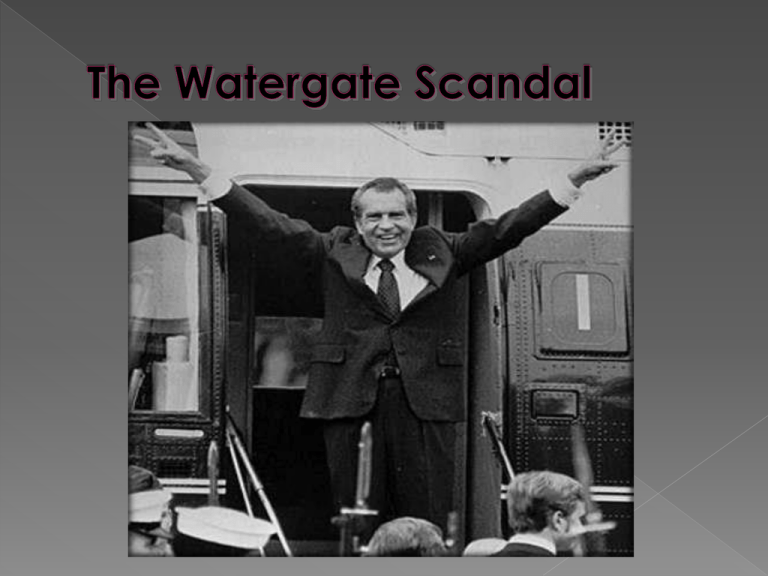Nixon-watergate
advertisement

Watergate scandal rocked the USA in early 1970s Started small and escalated › Phase 1: CREEP › Phase 2: Did Nixon know? › Phase 3: Battle for the tapes › Phase 4: The end 17 June 1972: Five ‘burglars’ arrested in Democratic Party Head Quarters in Watergate Hotel › Not stealing, but planting bugging devices › One was former CIA agent › All linked to Committee for the Re-election of the President (CREEP) › John Mitchell, CREEP director, used ‘dirty tricks’ to discredit Democrats › Two Washington Post reporters pursued own investigation › Nixon denied he or close advisors were involved › Nixon thought Watergate was behind him › He was wrong January 1973: › Watergate burglars on trial › All found guilty › One claimed White House involved Nixon reacts: › Denied allegation › Appointed Archibald Cox as special Watergate prosecutor › May-Nov. 1973: televised independent Senate investigation › Three of Nixon’s advisors resigned › One, John Dean (member of White House Counsel), claimed he discussed burglary at least 35 times with Nixon › Nixon denied any involvement, fired Dean (White House Counsel member are appointed by the president) Nixon’s tapes › Senate Investigation revealed Nixon recorded all conversations in oval office since 1971 › Senate & Cox wanted tapes › Nixon refused, citing “presidential privilege” 20 October 1973: “Saturday Night Massacre” Nixon ordered Attorney General to fire Cox He refuses, then resigns under pressure New special investigator, Leon Jaworski who also demands the tapes Nixon released some tapes, but 18 ½ crucial minutes had been “accidentally” erased April 1974: Battle over tapes continued › Nixon released 1200 heavily edited pages › Jaworski appealed to Supreme court Supreme Court ordered tapes turned over 27 July 1974: › House Judiciary Committee voted to impeach Nixon for obstruction of justice 8 August: › Nixon resigned to avoid impeachment › President Ford pardoned him Congress passed laws due to scandal › Privacy Act (1974): Americans can inspect government files on them › Budget Act (1974): President has to account for all $$$ spent (Nixon believed to have spent millions of government money on personal properties & evaded $400,000 of taxes) › Election Campaign Act: Limited campaign contributions; Limiting the influence of wealthy individuals and special interest groups on the outcome of federal elections Scandal utterly destroyed Nixon’s reputation › Called “Tricky Dick”, most achievements forgotten › Undermined America’s confidence in government › Press turned from hiding info to seeking scandal › Confidence & idealism of 60s replaced with skepticism and doubt Study these three cartoons, which do you think makes the following points? (Write these three things down in your notebook) › Nixon is a liar › America is in crisis › Don ‘t trust politicians Cartoon # 1 Cartoon # 2 Cartoon # 3 Focused on foreign affairs › Opened China › Reduced nukes with Soviets Promised exit from Vietnam › ‘Peace with dignity’; exited Vietnam (1973) Important advances on social issues › More blacks in college, voting, in politics Law and Order President Goal was to stop crime in America Enforcing laws: Antiwar protesters Draft evaders Deserters Fight Organized Crime Nixon cut taxes › Unfortunately, this fueled inflation 1. I would like for you to work in pairs. 2. You and your partner are both inmates in an insane asylum 3. One of you can only remember good things about people 4. The other can only remember bad things One day the two of you see a newspaper headline of Nixon’s resignation › The skeptic turns and says, “Well, it’s about time! Tricky Dick sure was a crook!” › The optimist replies, “How can you say that, after all of the good he has done! › Now its your turn…Write 12 additional lines of dialogue using facts from your notes! Chapter 19 Section 2 Identify: Sam J. Ervin, John Dean, Executive Privilege, Impeach, and The Federal Campaign Act Amendments. Reading Check Questions on page: 859,861, & 862




